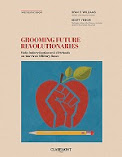United States troops serving overseas find that government
schools are indoctrinating their children and teaching them to keep secrets
from their parents.
According
to a report from the Claremont Institute, classes from the Department of
Defense Education Activity (DoDEA) teach children radical activism, gender
ideology, and hiding gender questions from families.
The lesson plans aren’t about teachers helping children
learn the basics; instead, they’re about teachers helping children hide facts
from their parents.
“Maybe that student is not ‘out’ to other students in their
gender identity,” seventh-grade humanities teacher Genevieve Chavez said in a
video provided to Claremont by a whistleblower. “They may be out at school; but
they may not be out at home.”
The
video was part of a 2021 summit talk titled “Ally 101—Creating an Inclusive
Classroom for LGBTQ+ Students.”
In the same talk, Chavez urged teachers to speak about new
gender identities with young children.
“You can talk about
LGBTQ+ things in elementary school,” she says. “It’s actually the ideal time.
Kids as young as 4 years old are already starting to develop a stable
understanding of their gender identity. Elementary school is the perfect time
because you can really show students the diversity of gender expression and
gender activity.
Claremont notes in its report that many parents disagree
with exposing children to gender confusion at an early age.
“Parents
have long taken for granted that cultivating a stable sexual identity is a key
to individual development. Our military schools think upsetting a stable
identity is the key to education,” the report states.
The 2021 summit urged teachers to filter every aspect of
school life through radical gender ideology, the report states.
Prom kings and prom queens should be homecoming court or
royalty or partners of distinction, teachers should say their own pronouns to
normalize it, and teachers can keep the preferred pronouns of students secret
from parents, according to Lindsey Bagnaschi, who was teaching high school
drama at Stuttgart High School in Germany, which serves local army bases.
It’s also a mistake to call a roomful of students ‘guys’ instead
of ‘seventh-graders’,Chavez says.
This year, students rejected the idea of scrapping the old
titles, the Claremont report states. But there’s always next year.
The DoDEA’s program also encourages students to activism,
according to the Claremont report. The DoDEA’s Strategic Initiatives seek to
provide equitable learning experiences for all students.”
To do so, the government suggests implementing “programs and
supports to address achievement gaps between racial, ethnic, ability, and other
identified groups” and provide “learning environments where students feel safe,
secure, and supported by the entire learning community.”
The DoDEA also promises to “stand up and grow Diversity,
Equity, and Inclusion (DEI) structures to lead and implement DEI across the
organization so that all students, employees, and families feel welcomed,
respected, engaged, and empowered.”
The Claremont Institute notes that none of the DoDEA’s focus
areas emphasize math, engineering, or any other form of academic excellence,
and never define terms like “Key Performance Indicators.”
According to the report, encouraging students to restructure
schools to hide the gender binary will teach them to restructure society as
adults.
“If students are used
to restructuring their school environment, they will become activists for restructuring
the general culture once they leave school,” the report states. “Future
citizens, sons and daughters of military personnel, will become much more like
their teachers than like their parents.”
A DoDEA presentation on equity and access tells teachers to
instruct students in having conversations about critical race theory, the
Claremont report states.
Such a conversation is one that “explores the relationship
between identity and power, that traces the structures that privilege some at
the expense of others, that helps students think through the actions they can
take to create a more just, more equitable, world,” according to the
presentation.
Tracy Shelton, a literacy coach at Feltwell Elementary,
which teaches the children of Americans serving at Air Force bases in Great
Britain, recommended that children study books to learn how to be antiracist,
the report states.
Racism and antiracism allow no neutral party, Shelton says.
“Racists, Shelton said, following the work of Ibram Kendi,
are those who do not fight for racial equity, while antiracists put the fight
for racial justice at the center of their lives,” the report states.
Even white people being silent are damaging, according to
presentations quoted by the report.
“I was reading ‘Me and White Supremacy’,” says one teacher,
and what it teaches “about white silence, and I realized the damage I was doing
by my white silence,” the report states.
If teachers can’t get radical books onto reading lists, they
can get them to children through independent reading time, book clubs, and
literature circles, says Merilee Debus.
Debus is a professional practice improvement specialist at
the DoDEA, according to her LinkedIn page.
“We still have a lot of room for getting the right book in
their hands when they need it.”
Another teacher, Betty Roberts of Robinson Barracks
Elementary School, which serves five military bases in Germany, recommends
reading books without critical race theory using critical race theory
interpretations, the report states.
She urged students to “take a look at their textbooks and
[to] identify … the biases and how underrepresented groups are represented in
these textbooks.”
The Claremont Institute ended its report with a call for
action from public officials and Congress. But if they don’t act, military
parents have one last nuclear option, the report concludes.
“It
seems that members of the military who object to such education are no longer
welcomed in the military. Perhaps they should just walk out of the military
schools with their children or walk away from the military altogether,” the
report states.






